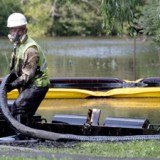The response of Enbridge to its spill of over 3 millions litres of oil from its ruptured pipeline into Michigan’s Kalamazoo River in July, 2010, should serve as a cautionary tale for anyone who thinks assurances negotiated with corporations are of any durable substance. In the single-minded quest for winning prospective profits or avoiding public relations catastrophes, corporations will typically make promises that are eventually fulfilled only in their own interests. Enbridge’s current legal manoeuvrings are a model example.
Immediately following the spill that contaminated about 55 km of river, Enbridge said it would pay for all damages. While a serious environmental impact could not be avoided, at least the public outrage could be quelled by a promise of compensation. Enbridge is now retracting its promise and contesting the claims against it. The legal thinking employed in this evasion of responsibility is worth noting.
Enbridge is arguing that it is not responsible for all the assessed damages of the spill because the actions of government officials in declaring a state of emergency, in recommending evacuation, and in closing the river to all public activity, incurred costs for which the corporation should not be legally liable. In int own words, Enbridge’s defence is that “federal, state and/or local authorities and agencies have mandated, directed, approved and/or ratified the alleged actions or omissions” for which Enbridge is expected to pay. Had the various authorities not taken the actions they deemed necessary to safeguard the public, the costs to Enbridge would have been lower. An assessment of Enbridge’s financial obligations will be mired in litigation for years.
Given this protracted litigation, Enbridge’s soothing assurance that it “remains committed to paying all non-fraudulent claims that are directly related to the incident” appear to be another empty public relations promise. In the legal challenge Enbridge is undertaking, the meaning of “directly related” must now be determined. So, too, must “non-fraudulent claims”, a determination now complicated by the degree to which the “actions or omissions” of government officials de-legitimized such claims. Add more years to the litigation process.
The lesson to be learned from this particular event is that corporations will initially provide whatever assurances are necessary to advance their profit objectives or to avoid a public relations fiasco. However, when confronted with the actual social, economic and environmental costs of their actions or oversights, the well-being of their shareholders becomes paramount. While affable executives may present a positive public image of corporations, the profit imperative commonly dilutes any admirable principles. Corporations are not philanthropic organizations interested in either fairness or justice; they are amoral legal entities that will only pay what is in their own interests to pay. Their explicit and fiduciary duty is to their shareholders. And in the world of law, where sophisticated legal strategists can discover complexities that can stall settlements nearly indefinitely, the length of the delay is determined by the net benefit to the corporation. Victims are not a consideration ‹ if they ever were.
Examples abound beyond Enbridge and its oil spill in the Kalamazoo River. Biologists have noted that BP’s strategy of spraying an estimated 7.2 million litres of toxic dispersants on the estimated 700 million litres of oil that erupted for months from its Macondo drilling site in the Gulf of Mexico in 2010 may have been far more environmentally damaging than letting the oil wash ashore where it could be collected for safe disposal. But the public relations image of such visible contamination was far worse for BP’s reputation than hiding the oil with dispersants. The implication is that the corporate interest superseded the environmental interest.
The 1989 Exxon Valdez spill in Alaska is a classic case of corporate litigation taking priority over fairness and justice. Exxon policy was to continually challenge the initial damage penalty of $5 billion, litigating details of the judgement until the human victims of the spill either died, were exhausted by the protracted court cases, or simply moved elsewhere to rebuild their shattered lives. After years of litigation, the US Supreme Court eventually reduced the damages to $507.5 million ‹ a profitable corporate strategy, despite the massive legal fees.
Business, of course, is always business. This is the heartless and amoral rationale that is supposed to comfort individuals, communities and environments that fall victim to corporate actions, omissions or oversights. Pulp mills open with lofty promises until they close with obligatory regrets. Lumber mills sustain families and towns until unfortunate necessity requires their demise. Salmon farms pledge risk-free ecological operations until biological reality collides with untenable assurances. Mines promise responsible operation until unforeseen circumstances create unmanageable problems.
Now Enbridge is proposing to build a 1,172 km Northern Gateway pipeline from Alberta to Kitimat through some of the most challenging and remote territory on the planet, a project that will expose rivers, landscapes and a pristine BC coast to inevitable oil spills. Enbridge is enticing reluctant First Nations with financial incentives approaching $1 billion. Its corporate machinery will comfort the public with the usual assurances of safety, precaution and reliability.
But the public should always be wary of corporations bearing promises. Witness the Kalamazoo River in Michigan, the Macondo site in the Gulf of Mexico and the Exxon Valdez in Alaska as three reminders that corporate promises can end in environmental disaster, personal grief and protracted litigation. The ingenuity that makes corporations so successful can also be turned against the society that is supposed to benefit from their existence. Forget ethics. Whether or not corporations keep their promises depends on the business of business.


Check out this video about how Enbridge is asking workers to cover up the oil that was spilled in Michigan – http://vimeo.com/22067803
And they expect those of us in NW British Columbia to trust them with their mega-Northern Gateway pipeline project? No thanks Enbridge.